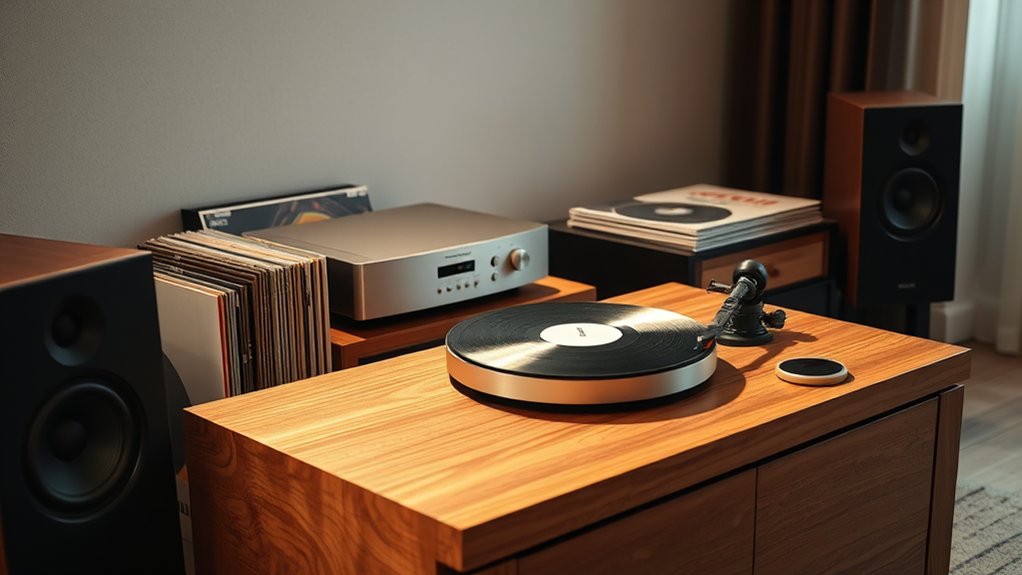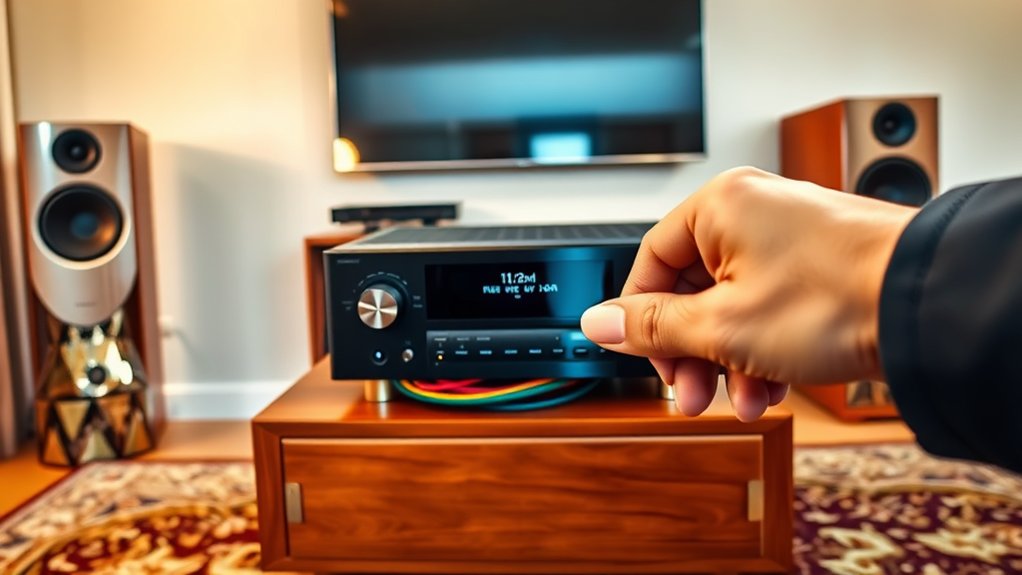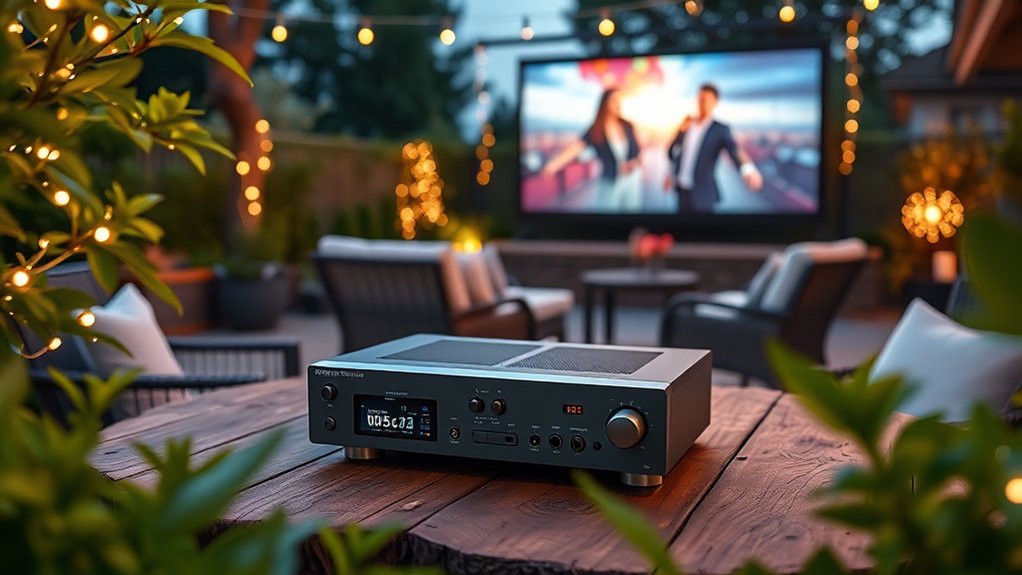When choosing an AV amplifier for vinyl, start by ensuring it has a dedicated phono input, which is essential for amplifying those weak turntable signals. Look for features like adjustable gain and loading to match your cartridge type for ideal sound quality. Consider how many inputs you’ll need for future devices, as you keep an eye on total harmonic distortion (THD) for clearer audio. Curious about specific models that deliver this balance?
Key Highlights
- Ensure the AV amplifier has a dedicated phono input with a built-in preamp for easy connectivity and signal amplification.
- Consider sound quality factors like low total harmonic distortion (THD) for clearer and more faithful audio reproduction.
- Look for adjustable loading and gain controls to tailor the sound based on your specific cartridge type.
- Check for RCA inputs and a grounding terminal to prevent hum and ensure optimal connection between components.
- Prioritize models with multiple inputs for future upgrades and compatibility with various audio devices.
Understanding Phono Inputs and Preamp Options
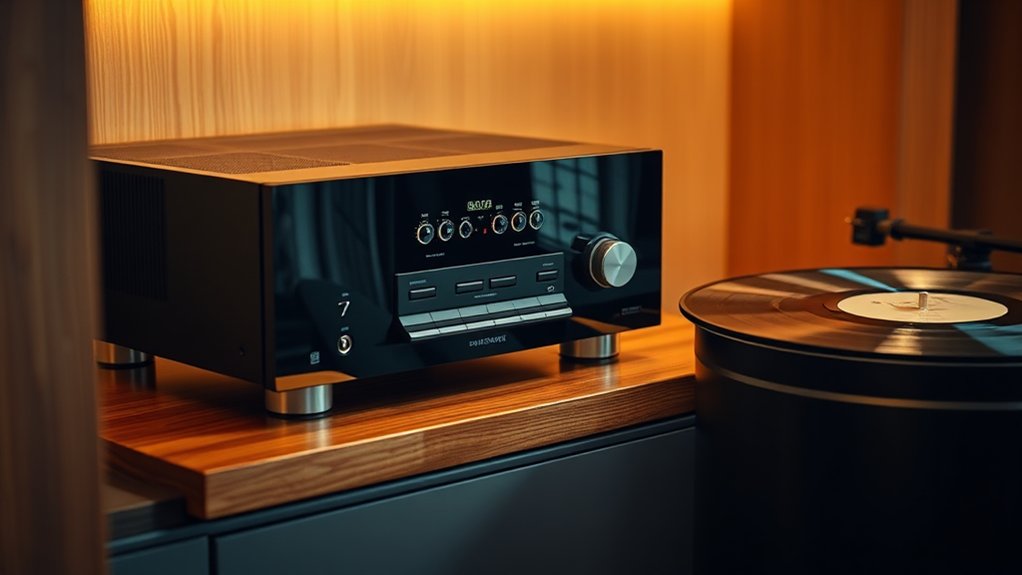
When you’re diving into the world of vinyl, have you ever wondered why phono inputs and preamps seem to be such a big deal?
Well, they’re crucial for turning the weak signals from your turntable into sounds you can actually enjoy. Different cartridges, like Moving Magnet (MM) and Moving Coil (MC), need specific phono preamps to function properly. A phono pre-amplifier is essential for vinyl playback especially for newcomers to turntables. This is because a preamp boosts weak signals from the turntable to ensure they reach a level suitable for speakers.
Think of it like needing the right adapter for your electronics—mixing them up leads to lackluster sound quality that can ruin your listening experience.
Many modern preamps even handle both types, giving you flexibility if you decide to switch cartridges down the line.
Assessing Sound Quality and Amplifier Design
Although you might think that any AV amplifier can do justice to your vinyl records, the truth is that sound quality and amplifier design play pivotal roles in preserving the rich nuances of analog playback.
For starters, low total harmonic distortion (THD) guarantees a cleaner sound, allowing vinyl’s warm details to shine through. Moreover, having adequate power output—think 10W for general listening and up to 100W for larger rooms—makes a noticeable difference. This is especially important because many AV receivers lack a dedicated phono input, which is crucial for proper amplification of magnetic cartridge signals. A well-selected amplifier also ensures matching impedance with your speakers to enhance audio performance.
Circuit design matters too; discrete transistor amplifiers usually outperform integrated ones regarding transparency and fidelity. A strong power supply also aids in minimizing unwanted noise, making sure those quiet passages aren’t muddied.
After all, who wants to hear hiss when the music should be singing?
Key Connectivity and Setup Considerations
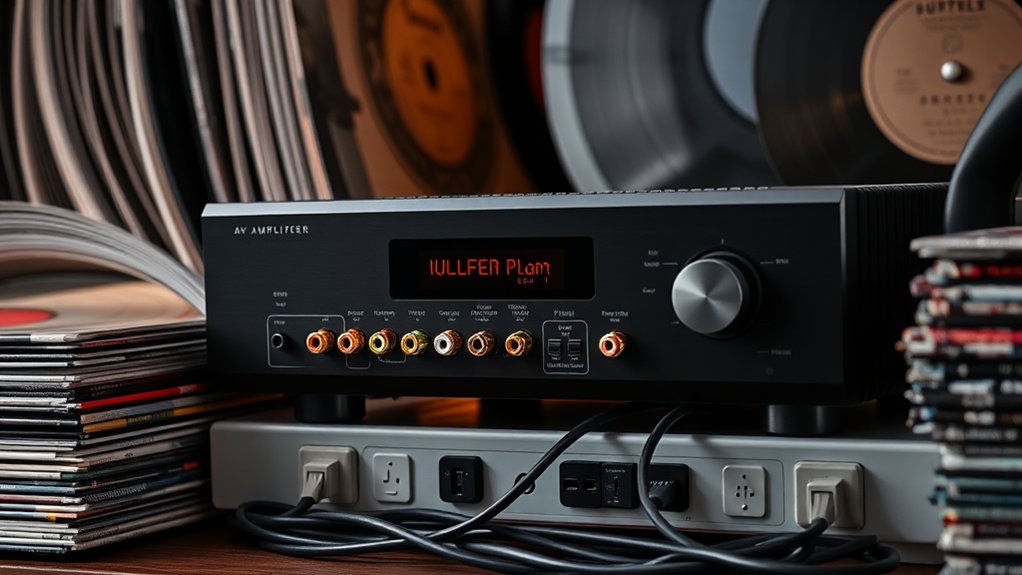
Understanding the right connections and setup for your vinyl system is just as important as the amplifier’s sound quality and design.
First, look for a dedicated PHONO input, ideally with a built-in preamp, to amplify your turntable’s signal. You’ll additionally need RCA inputs and outputs for connecting various components. The Fluance RT81 turntable is known for its built-in phono preamp, enhancing its compatibility with various amplifiers.
Don’t forget a grounding terminal—this connection prevents annoying hums (you don’t want your tunes interrupted by noise). If you’re using passive speakers, ensure your amplifier’s power matches their requirements to avoid any distortion. Additionally, knowing if your turntable has a built-in preamp can inform your choice of amplifier setup.
It’s helpful to have multiple inputs for future devices and even outputs for subwoofers.
Finally, check that your speaker wires are connected correctly; after all, you want your audio to hit the right notes!
Features That Enhance Vinyl Playback
Choosing the right features for enhancing vinyl playback can feel a bit overwhelming, especially when you’re diving into the intricate world of sound. To truly appreciate your records, look for an AV amplifier with a dedicated phono input and a quality preamp that supports RIAA equalization. This feature corrects frequency response, ensuring every note resonates beautifully.
Adjustable loading and gain controls let you tailor the sound to your cartridge type, whereas tone controls add a layer of personalization. Ensure the amplifier boasts low total harmonic distortion (THD+N) for faithful sound reproduction; nobody wants their favorite song to sound like a tin can, right?
Finally, sturdy front panel controls keep things user-friendly, bringing that analog warmth you crave right at your fingertips.
Budgeting and Future Upgrade Considerations
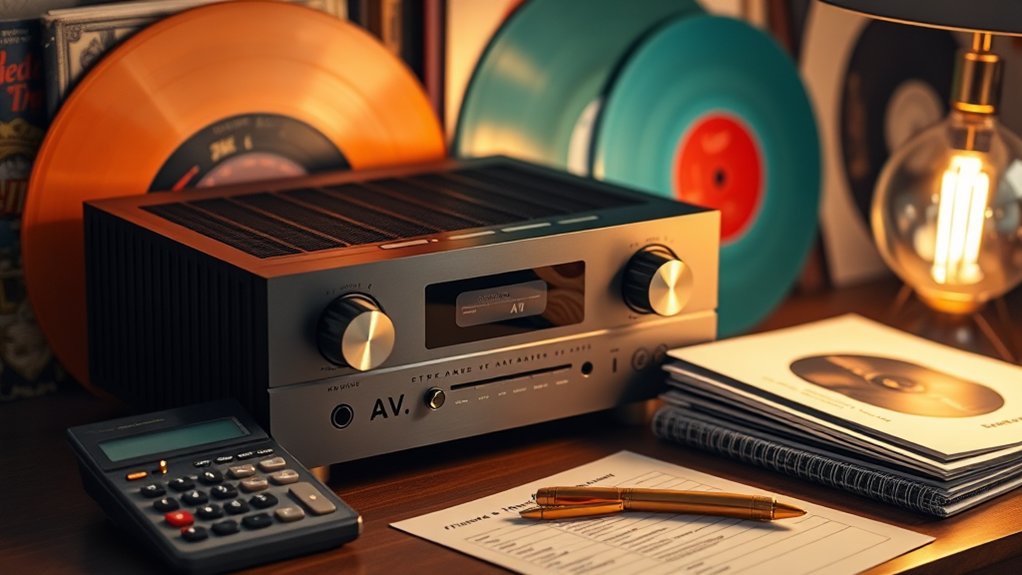
When you’re thinking about budgeting for an AV amplifier tailored for your vinyl collection, it’s important to balance your love for music with the reality of your finances.
You can find AV amplifiers ranging from around $300 to over $1,500, but remember: prioritize audio quality over flashy features.
Budget models like the Yamaha RX-V6A give you solid sound without breaking the bank.
As you plan for the future, choose amplifiers that support upgrades—think modular designs or multiple inputs.
Consider integrated or stereo amps for budget-friendly options that focus solely on vinyl.
Finally, don’t just chase the cheapest option; investing in a reputable brand often means enjoying better sound quality and retaining value if you ever decide to sell.
Frequently Asked Questions
Can I Use Bluetooth Turntables With AV Amplifiers?
Yes, you can use Bluetooth turntables with AV amplifiers. Simply connect wirelessly if your amp has Bluetooth capability, or use an RCA output for direct wired connection for better sound quality without potential Bluetooth limitations.
What Speaker Types Work Best With AV Amplifiers for Vinyl?
For vinyl, you’ll find passive speakers, especially two-way or floorstanding models, work best. Look for moderate sensitivity ratings and natural acoustic designs to improve warmth and clarity, creating a richer listening experience.
Do AV Receivers Support High-Resolution Audio Formats?
Yes, most AV receivers support high-resolution audio formats like Dolby TrueHD and DTS-HD Master Audio. They maintain high fidelity with formats such as FLAC and WAV, allowing you to enjoy superior sound quality on your system.
How Important Is Amplifier Brand for Vinyl Playback?
When considering brand importance for vinyl playback, you should prioritize established names. They often guarantee sound quality, reliability, and innovative features. Choosing a reputable brand ascertains a richer, more satisfying listening experience for your vinyl records.
Will Using Multiple Devices Affect Sound Quality?
Using multiple devices can impact sound quality if they’re not properly matched. Make certain each device has compatible input sensitivities and maintain short, high-quality connections to minimize noise and interference for the best audio experience.

